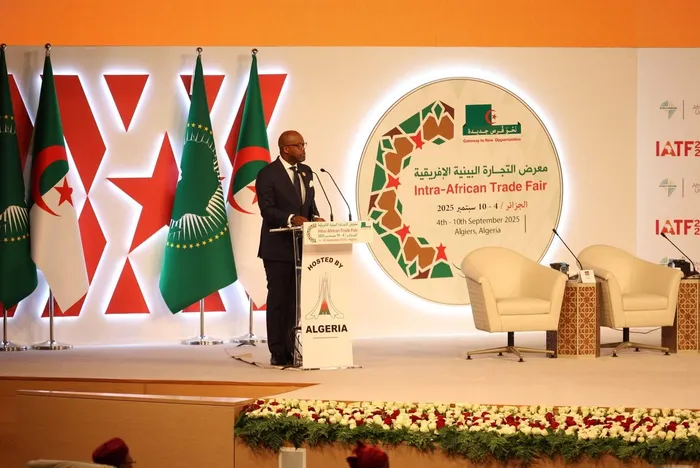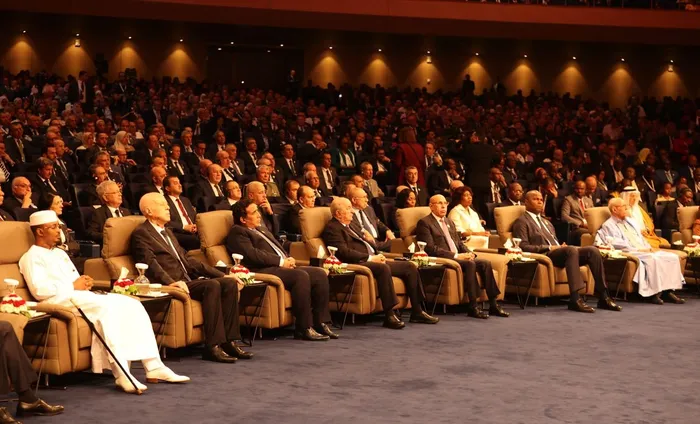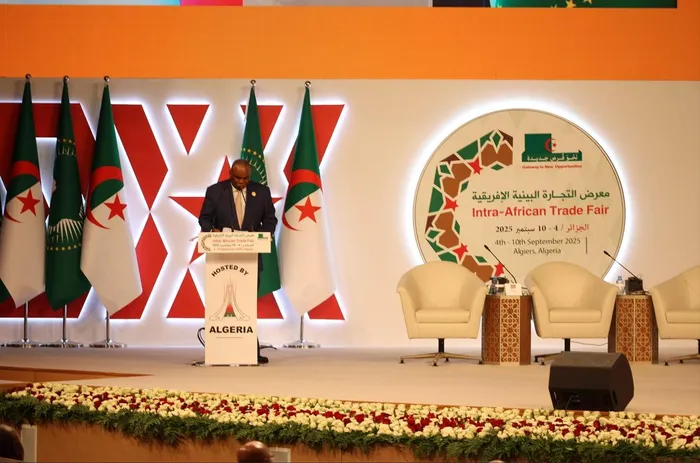
Wamkele Mene, Secretary General of the AfCFTA Secretariat, speaking during the opening of the 2025 Intra-Africa Trade Fair (IATF2025) held in Algeria.
Image: Supplied
The African Continental Free Trade Area (AfCFTA) is emerging as a transformational force within the continent’s economy, with vital developments highlighting its potential to elevate trade and foster economic collaboration.
This was underscored during the opening of the 2025 Intra-Africa Trade Fair (IATF2025), held in Algeria, where delegates gathered to celebrate significant milestones in African trade.
At the IATF’s opening ceremony, Wamkele Mene, Secretary General of the AfCFTA Secretariat, announced that intra-African trade experienced a vigorous rebound in 2024, climbing to $220.3 billion—a significant 12.4% increase from the previous year.
This data is extracted from the African Trade Report 2025 produced by the African Export–Import Bank (Afreximbank).
Mene said this growth signals an escalating confidence in Africa's integration strategy under the AfCFTA, illustrating a shared commitment towards fostering economic collaboration.
“Beyond the headline figures, the data shows a gradual shift in the continent’s trade composition. While primary commodities still dominate, there is a clear growth in machinery, motor vehicles, food products, chemicals, and electronics,” Mene said.
“This shift signals our continent’s transition from raw commodity dependency toward industrial diversification, a shift that will only be sustained by stronger logistics and manufacturing value chains.”
Mene said the groundwork for this ambitious trade ecosystem was being meticulously laid through the implementation of eight key protocols, along with operational instruments that include the rules of origin, the e-Certificate of Origin, and the Pan-African Payment and Settlement System.
Additionally, he said the AfCFTA Adjustment Fund and a Private Sector Engagement Strategy underpin these efforts, paving the way for a single continental market that is diverse and resilient.
“The Digital Trade Protocol in particular opens new avenues for e-commerce, fintech, and ICT-enabled services. If harnessed fully, it can generate millions of jobs for Africa’s young people and ensure that the continent is not left behind in the global digital economy,” Mene said.

More than 2 000 exhibitors, including businesses from the African continent and globally, are showcasing their goods and services to the visitors and buyers while exploring opportunities and exchanging information.
Image: Supplied
The IATF - which is organised by the African Export-Import Bank (Afreximbank), in collaboration with African Union Commission and AfCFTA Secretariat - aims to increase intra-African trade and showcase the investment opportunities across this region and the continent.
More than 2 000 exhibitors, including businesses from the African continent and globally, are showcasing their goods and services to the visitors and buyers while exploring opportunities and exchanging information.
This is projected to translate into over $44 billion in trade and investment deals.

Prof. Benedict Oramah, president and chairman of the Afreximbank, praised the IATF as a significant platform that has successfully launched innovative ideas since its inception in 2018.
Image: Supplied
Prof. Benedict Oramah, president and chairman of the Afreximbank, praised the IATF as a significant platform that has successfully launched innovative ideas, initiated 12 initiatives, forged invaluable partnerships, and revealed previously unimagined market opportunities since its inception in 2018.
He expressed confidence that the IATF has developed into a robust ecosystem capable of supporting young Africans in reshaping the narratives of business, health, and social interaction on the world stage.
“The journey we began in 2017, when we started planning for the inaugural Trade Fair, which was held in November 2018, was a strategic move drawn from Afreximbank’s Intra-African Trade Strategy, launched in 2016,”Oramah said.
“I am convinced that we have built a solid platform that can stand the test of time. After four events and almost eight years, it is time to institutionalise the initiative and lessen the burden on Afreximbank and its collaborating partners, the AUC and AfCFTA Secretariat.”
Oramah also announced a major development, revealing that Harare in Zimbabwe will now serve as the headquarters of an independent IATF entity following a robust competition among various countries.
Additionally, Oramah disclosed that the Afreximbank board has approved an initial capitalisation of $28 million for this new entity.
He urged African governments, corporations, and financial institutions to lend their support during the critical early stages, reinforcing the shared vision for a unified and prosperous African market.
BUSINESS REPORT